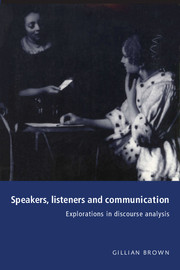Book contents
- Frontmatter
- Contents
- Acknowledgements
- Transcription conventions
- Introduction
- 1 Speakers, listeners and communication
- 2 The Map task method
- 3 Identifying features in a landscape
- 4 Guiding the listener through the landscape
- 5 The Stolen letter task: understanding reference to individuals in a narrative
- 6 Understanding narratives
- 7 The listener and discourse comprehension
- Epilogue
- References
- Index
2 - The Map task method
Published online by Cambridge University Press: 05 June 2012
- Frontmatter
- Contents
- Acknowledgements
- Transcription conventions
- Introduction
- 1 Speakers, listeners and communication
- 2 The Map task method
- 3 Identifying features in a landscape
- 4 Guiding the listener through the landscape
- 5 The Stolen letter task: understanding reference to individuals in a narrative
- 6 Understanding narratives
- 7 The listener and discourse comprehension
- Epilogue
- References
- Index
Summary
In this chapter, I shall introduce the Map task method, and begin to explore some of its benefits and limitations as a window on the processes of interpretation. First, I shall set the approach in context by rapidly reviewing existing well-established research paradigms.
Methods and problems with methods
There are two perennial issues which confront anyone who is engaged in a theoretical enquiry into the nature of interpretation, or even in an empirical enquiry which is simply trying to determine whether or not a listener has understood an utterance. The first lies in defining what will count as adequate interpretation. The second is the problem of method. I am going to put aside the first question for the moment, simply assuming a commonsense view of adequate understanding which I shall attempt to refine in later chapters. In this chapter I shall concentrate on the second issue. How do you decide whether or not an utterance has been understood? Since we have no access to what is going on inside people's heads as they work out what an utterance means, we can only observe their behaviour after having interpreted all or some part of an utterance as they put the utterance to use. Alternatively, or additionally, we may have resort to imaginative reconstruction of what we think that the listener has understood, based on an empathetic assessment of how, if at all, we would have understood the utterance ourselves, had we been the intended listeners.
Information
- Type
- Chapter
- Information
- Speakers, Listeners and CommunicationExplorations in Discourse Analysis, pp. 32 - 55Publisher: Cambridge University PressPrint publication year: 1995
